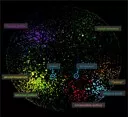Berkman Center Internet & Democracy Project Releases Study Mapping Iran’s Blogosphere
Cambridge, MA - The Berkman Center for Internet & Society’s Internet & Democracy project has released a major study on “Mapping Iran’s Online Public: Politics and Culture in the Persian Blogosphere." Utilizing a unique methodology that blends computational analysis and human coding, the study investigates the contours and scope of the discussions taking place in the Persian blogosphere.
“In contrast to the conventional wisdom that Iranian bloggers are mainly young democrats critical of the regime,” write authors John Kelly and Bruce Etling, “we found a wide range of opinions representing religious conservative points of view as well as secular and reform-minded ones, and topics ranging from politics and human rights to poetry, religion and pop culture.”
The study reveals that:
* The Persian blogosphere embraces approximately 60,000 routinely updated blogs from a diverse mix of bloggers.
* The Iranian blogosphere is dominated by four major network formations with identifiable sub-clusters: 1) Secular/Reformist, 2) Conservative/Religious, 3) Persian Poetry and Literature, and 4) Mixed Networks.
* Anonymous blogging is more common in the Conservative/Religious network formation than in the Secular/Reformist one.
* State blocking of blogs is less pervasive than expected, though clearly more common in the Secular/Reformist network formation.
“Mapping Iran’s Online Public” and the map image of Iran’s blogosphere can be downloaded at http://cyber.harvard.edu/publications/2008/Mapping_Irans_Online_Public.
This study is the third case in a series produced by the Berkman Center's Internet & Democracy project. The initial cases include two of the most frequently cited examples of the Internet’s influence on democracy: the user-generated news site OhmyNews and its impact on the 2002 Presidential elections in South Korea; and nontraditional media and the use of cell phone technologies for information sharing and organization of protesters during Ukraine’s Orange Revolution. Additional cases are being developed, including the mapping and analyzing of other blogospheres from around the world.
About the Internet & Democracy project
The Internet & Democracy Project is an initiative of the Berkman Center for Internet & Society that examines how the Internet influences democratic norms and modes, including its impact on civil society, citizen media, government transparency, and the rule of law, with a focus on the Middle East. The goal of this work is to support the rights of citizens to access, develop and share independent sources of information, to advocate responsibly, to strengthen online networks, and to debate ideas freely with both civil society and government. More information can be found at http://cyber.harvard.edu/research/internetdemocracy.
About the Berkman Center for Internet & Society
The Berkman Center for Internet & Society at Harvard Law School is proud to celebrate its tenth year as a research program founded to explore cyberspace, share in its study, and help pioneer its development. Founded in 1997, through a generous gift from Jack N. and Lillian R. Berkman, the Center is now home to an ever-growing community of faculty, fellows, staff, and affiliates working on projects that span the broad range of intersections between cyberspace, technology, and society. More information can be found at http://cyber.harvard.edu and http://www.berkmanat10.org.
###
Contact Seth Young
617.384.9135
[email protected]
